
How to Mirror Your Xiaomi Redmi 13C Screen to PC with Chromecast | Dr.fone

How to Mirror Your Xiaomi Redmi 13C Screen to PC with Chromecast
As times progress, technology is in competition with it and this article about Chromecast will inform you how it works and how to mirror your Android screen to a PC with Chromecast. Chromecast is a very handy technology and it will be a huge part of the future. To learn more about Chromecast, the recommended Chromecasts, and how it works, continue reading this informative article.
If you have an android device and you wish to mirror (share) the screen to your PC, this can be done using some simple steps, but to do this it depends on the android device you have and the source that you will project it to, whether a TV or PC. The recommended Chromecast to mirror your android screen to your PC is All cast, Koushik Dutta’s Mirror that comes with most android devices or can be downloaded, and for persons who use Custom Roms, cyanogen Mod 11 Screencast can be used. It is very important that the PC that will mirror the android device screen has AllCast Receiver installed because this software enables all the features of mirroring to be enabled on the receiving end.
1. What is Chromecast?
Chromecast is a form of modern technology established and mananged by Google, which enables an individual to project or display whatever they have on their Android device screen on a secondary screen such as a PC or TV. More interestingly Chromecast is just a small device that can be plugged into a PCs HDMI port to allow for easy casting on a bigger screen. The capability is called mirroring and it is very prevalent in today’s society. Chromecast is very convenient because sometimes individuals cannot be bothered with a small mobile screen if they are watching a movie for instance of playing their favourite games such as FIFA 2015. The technology of Chromecast is possible because of the chrome app for both PC and Android mobile devices to date. Chromecast allows the casting of all your favourite mobile activities straight to your PCs screen.
2. The features of Chromecast
•Chromecast works with a majority of apps – There is no need to worry about available applications when purchasing Chromecast and setting it up. It works with a huge amount of apps, that you will likely want to stream and mirror to your big screen. Apps such as Netflix, HBO, Google Music, Youtube, IheartRadio, and Google Play are fully capable of mirroring to your PC hassle free, because it only take a few steps to set up.
•Beautify even when you’re not casting – If your device should stop casting for a few minutes or you just want to listen some music and relax. You can do so in fine style because Chromecast has a feature that can allow the entire background of your PC to be set to satellite images, beautiful artworks or personal photos from your library in a backdrop form, meaning that the entire background will look rich and beautiful with whatever you choose it to be.
•Availability - Chromecast is available for everyone as it is already compatible with hundreds of android devices that individuals already own and use on a daily basis.
•Inexpensive - The cost to use Chromecast is just $35 which is very much affordable and economical in today’s society. When you purchase the Xiaomi Redmi 13C device it’s yours for a lifetime.
•Ease of access and setup - Chromecast is easy to use, all you need to do is plug and play to enjoy its many features.
•Auto update – Chromecast automatically updates so you can have new apps and features that are compatible and available without effort or hassle.
3. The Steps on How to Mirror
Step 1. Download and setup Chromecast on both devices from the play store, the play store is an app on your Xiaomi Redmi 13C devicethat allows you to download hundreds of other apps.

Step 2. Plug the chrome cast into the HDMI port at the side of your personal computer and follow the setup instructions that will be displayed on the screen.
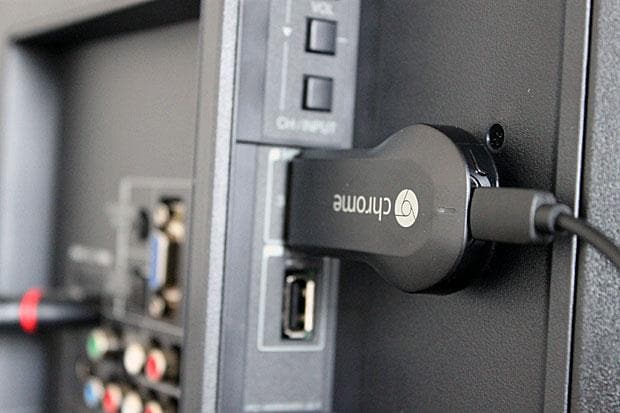
Step 3. Ensure that your Chromecast and PC are on the same Wi-Fi network, this will enable Chromecast to work.

Step 4. Open a supported Chromecast app that you downloaded from the plays store and tap the cast button normally at the top right or left corner of the app.

Step 5. Enjoy Chromecast.
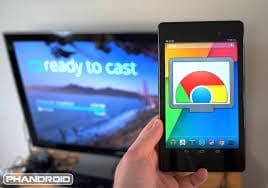
4. Supported Android Devices
There are a wide range of devices that are supported by Chromecast, these devices include:
- 1.Nexus 4+
- 2.Samsung Note Edge
- 3.Samsung Galaxy S4+
- 4.Samsung Galaxy Note 3+
- 5.HTC One M7+
- 6.LG G2+
- 7.Sony Xperia Z2+
- 8.Sony Xperia Z2 Tablet
- 9.NVIDIA SHIELD Tablet
- 10.Tesco hudl2
- 11.TrekStor SurfTab xintron i 7.0
5. Advanced Casting Features
Chromecast has some advance features that every user should definitely know and use such as:
- • Chromecast can be used by your family members of friends, without them accessing your WIFI network. So you will not have to worry about hacking into your Wi-Fi network when someone is using your Chromecast.
- •Chromecast is also compatible with IOS mobile devices and tablets – A lot of persons find this feature very hand since they have IOS devices. No need to worry as these devices are fully compatible with Chromecast.
- • You can cast a website to your TV from a laptop or mobile device – Advanced features of Chromecast allows easy casting of webpages to your laptop or even a television from a mobile device.
A Guide Xiaomi Redmi 13C Wireless and Wired Screen Mirroring
In simple words, screen mirroring is an approach to mirror the screens of two devices with one another. For instance, you can mirror your Android phone screen on the computer and the other way round. In this article, viewers will get to know how to mirror an Android screen on PC wirelessly or through a USB cable.
Screen Mirroring is quite useful in many ways. It allows you to display the screen of your Android phone, tablet, or PC on another device through a wired or wireless connection between both devices. In today’s life, not everyone is familiar with screen mirroring technology.
Part 1: What is Screen Mirroring?
Screen Mirroring is such technology that permits you to display your content from your device to another device. In the case of screen mirroring Xiaomi Redmi 13C PC, this could be done through both wireless and wired connections. At the same time, screen mirroring can be done when one device continuously sends the copy of its screen to another targeted device simultaneously.
In a meeting or presentation, screen mirroring plays an important role by facilitating team members to avoid complex setups and share their screens immediately. Moreover, screen mirroring supports the BYOD model, that is, “Bring Your Own Device.” The reason for supporting this model is to lower the cost and increase efficiency.
Part 2: Prerequisites for Android Screen Mirroring
To successfully cast Android screen to PC, the screen mirroring apps should work properly. For this purpose, it is recommended to do some settings on your Android device. The steps of settings for enabling both developer options and USB debugging are discussed below:
Enable Developer option
Step 1: Open the “Settings” app on your Android phone and choose “System” settings from the list. Now click on the “About Phone” option from the top of the screen.
Step 2: Now, you need to scroll down and click the “Build Number” option five times.
Step 3: Proceed back on the “System” settings, where you will find a “Developer” option present.
Enable USB Debugging
Step 1: First, open your Android phone “Settings” and go to “System” settings. Now click on the “Developers” option on the next screen.
Step 2: Now go down and turn on the “USB Debugging” option.
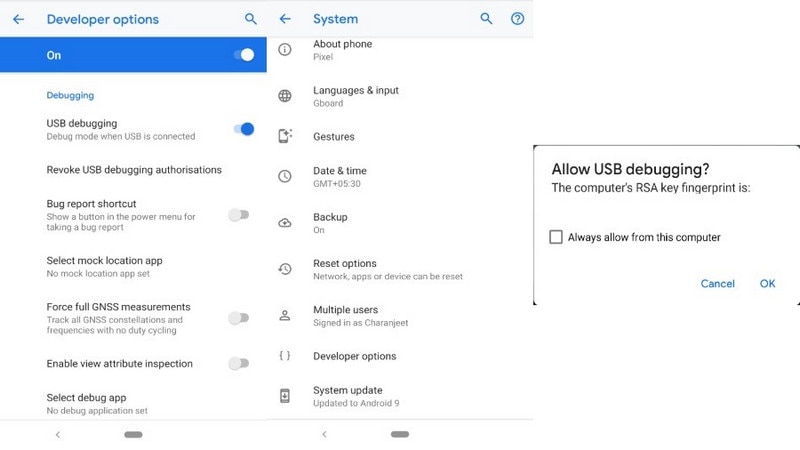
Part 4: Efficient and Fast Wireless Android Screen Mirroring Tool - MirrorGo
If you are looking for an advanced experience of mirroring your Android device with the PC, Wondershare Dr.Fone features an intelligent solution with efficiency. Whether you are presenting your business idea across a large screen or enjoying gaming with your friends, MirrorGo presents a quick and simple solution for mirroring your device with ease.
Wondershare Dr.Fone
Mirror your Xiaomi Redmi 13C deviceto your computer!
- Utilize the Game Keyboard for mapping the keys across your keyboard to an Android device.
- Easily manage and control your Android phone across the PC with the help of peripherals.
- MirrorGo enables an easy route of transferring files between the PC and Android device.
- Users can record their screens using the tools available on MirrorGo.
4,025,791 people have downloaded it
To understand the simple process of mirroring your Android screen across the PC, you need to follow the steps explained as follows:
Step 1: Download, Install and Launch
Users are requested to download the latest version of MirrorGo from their official website. Once installed, launch the application on the computer.
Step 2: Same Internet Connection
The user needs to ensure that the PC and Android device are connected across the same Wi-Fi connection. Once done, tap on the option of “Mirror Xiaomi Redmi 13C PC via Wi-Fi” on the lower bottom of the application’s interface.
Step 3: Attach through USB over Unsuccessful Connection
If the user fails to mirror the Xiaomi Redmi 13C device directly through Wi-Fi, they can connect their Android device with the PC via USB. Before that, it is important to turn on USB Debugging across the Android device for successful connection. Once the phone appears under “Select a device to connect,” you can remove the Android phone from the USB connection.
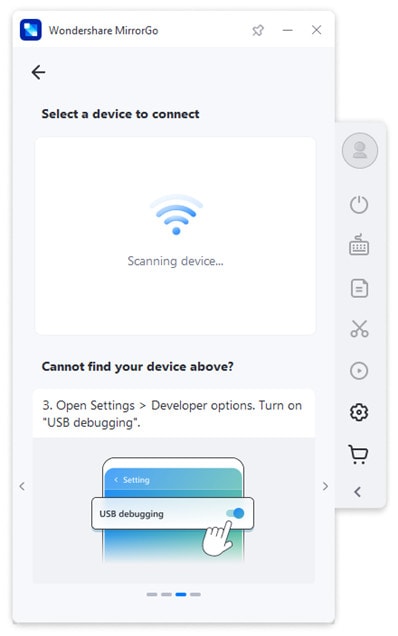
Step 4: Mirror and Control
Over selecting the Xiaomi Redmi 13C device for connection, a mirroring platform is established on the PC, and the user can now easily manage and control the Android screen across the PC.
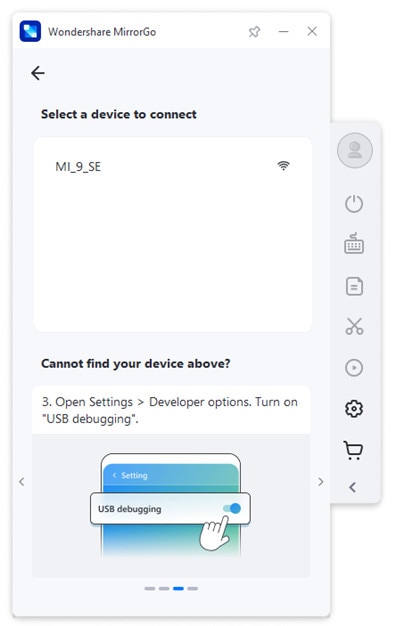
Part 3: Ways to Screen Mirror Android with USB Cable
In this part of the article, we will discuss the most efficient ways to mirror Android screen on PC via USB cable. These ways include efficient applications like Vysor and ApowerMirror. Both of these applications allow a wired USB cable connection between two devices for the purpose of screen mirroring.
3.1 Screen Mirror Android Using Vysor
Vysor is a substitute screen mirror application that helps you to control your Android device through a laptop or PC. By using Vysor, you can play games, project your content in meetings or presentations, share data, etc., through screen mirroring.
Well, the advantages of this screen mirroring application include a bigger screen size, a high-resolution mirror, and no compulsory requirement for root access. It also supports Windows, GNU/LINUX, and macOS. Some of the steps below will show you how to do screen mirroring Xiaomi Redmi 13C PC or laptop using Vysor.
Step 1: Simply download the Vysor application from your “Google Play Store” application on your Android device.
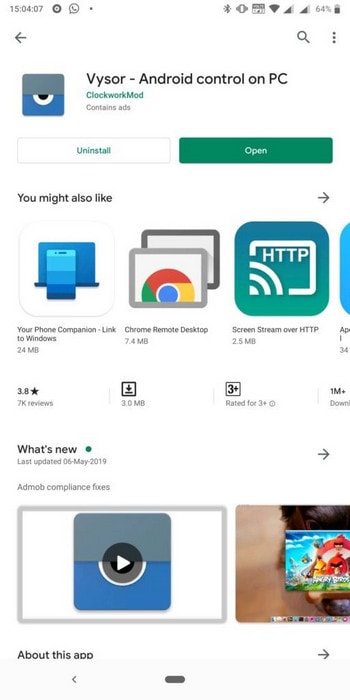
Step 2: Now, you need to download the Vysor application for your PC or laptop in order to access screen mirroring. Vysor is available for all Mac, Chrome, Windows, and Linux.
Step 3: After complete downloading, you can now connect your Android device with a PC using a USB cable or Micro-USB.
Step 4: After a successful connection, you can now open the “Vysor” app on your Android device to check the basic setup. During the basic setup procedure, you need to turn on the “USB debugging” option. You can find it in the “Developers Options” for the proper working of the Vysor app.
Step 5: You need to allow USB debugging for your PC after opening Vysor. You just have to select “Ok” from the box that appears on the screen of your Android device.
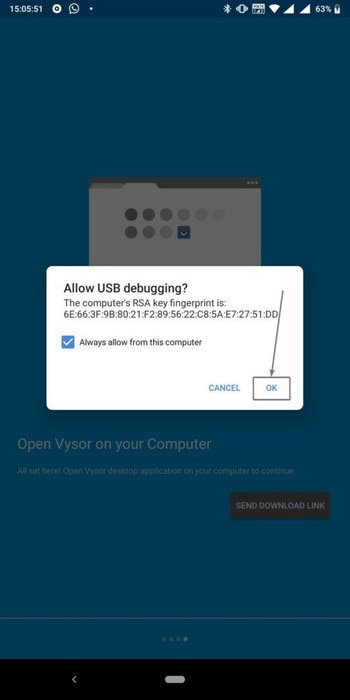
Step 6: You can now see your Android device name on your PC on the Vysor app. You just need to click on the “View” option to see your Android device.
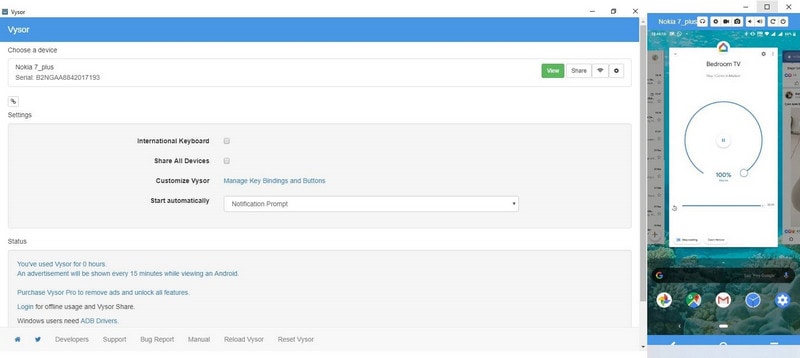
3.2 Control Android Screen Using ApowerMirror
ApowerMirror counts as one of the best screen mirroring applications among all the others. This app mainly applies the mainstream mirroring technology that is the reason for its ultimate mirroring experience. You are required to follow some steps that are listed below to cast Android screen to PC via ApowerMirror:
Step 1: Open your Android device “Settings” app and scroll down at the bottom of the page to see the settings of “Developer options.” Now further check the option of “USB debugging” and turn it on.
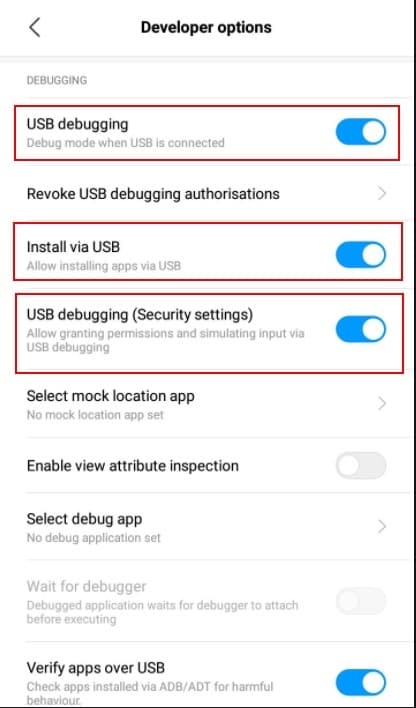
Step 2: In this step, you need to download ApowerMirror on your PC and install its setup. Now open the app from the Desktop.
Step 3: Now, use a USB cable to connect your Android device with your PC. After that, check the notification that appears on your Android device. Begin the mirroring process by clicking on the “Start Now” option in that notification.
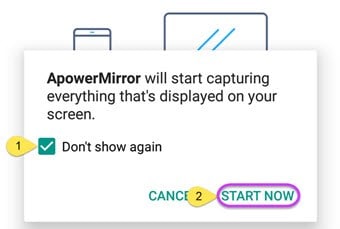
Step 4: At last, you can now entertain yourself on a much bigger screen by controlling your Android device.
Final Words
This article covers everything about screen mirroring and its working with the need to cast Android screen to PC. We have discussed the concept of screen mirroring both by wired or wireless connection. With the help of this article, you can now share your Android screen on a laptop or PC and can share data like documents, images, games, etc.
Furthermore, Wondershare introduces us to software like MirrorGo. It helps us to build a wireless connection between devices that we want to connect for screen mirroring purposes.
3 Methods to Mirror Xiaomi Redmi 13C to Roku
Back from vacation and want your family members or friends to see your pictures and videos? Instead of showing these pics on a small android screen, it would be more mesmerizing if you showed them on a big Roku screen. But the question arises, is it possible to mirror Xiaomi Redmi 13C to Roku? Yes, you can! With technology evolving, there are now many ways that allow individuals to effortlessly mirror Xiaomi Redmi 13C to Roku and share whatever is going on a small android screen on a big Roku screen. Just imagine playing counter-strike on a big TV screen.
3 Methods to Mirror Xiaomi Redmi 13C to Roku
Method 1 Use Android Mirroring Feature to Mirror
The most genuine and reliable way is to use the Android Mirroring Feature of the Xiaomi Redmi 13C device itself. It involves no third-party app. By following a few simple steps, you can easily stream all your Android Device movies and videos to Roku.
Step 1: Enable the “Screen Mirroring” Feature on Roku
- Enter the settings menu of the Roku device and tap on the option of “System.”
- After that, tap on the option of “Screen Mirroring.”
- Now from here, enable the option of Screen Mirroring.
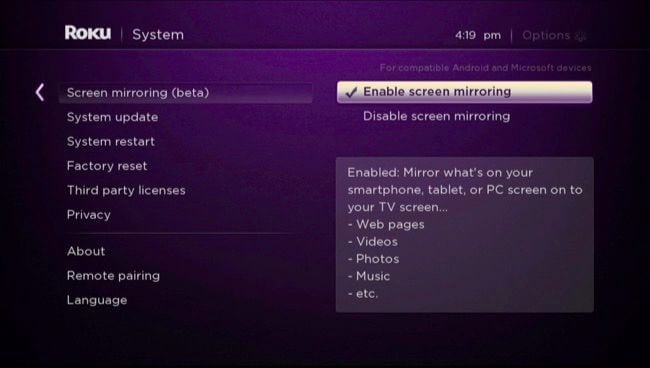
Step 2: Cast Android to Roku:
- On your Android device, enter the “Settings” menu, and tap on the option of “Display”.
- Here you will find an option of “Cast Screen”. Tap on it.
- Now select the option of the menu followed by the selection of “Enable Wireless Display.”
- Doing so will show your Roku on the section of Cast Screen.
An alternative way for Samsung Users:
- Swipe down the notification panel; here, you will find an option of “Smart View” or “Screen Mirroring”. Tap on it.
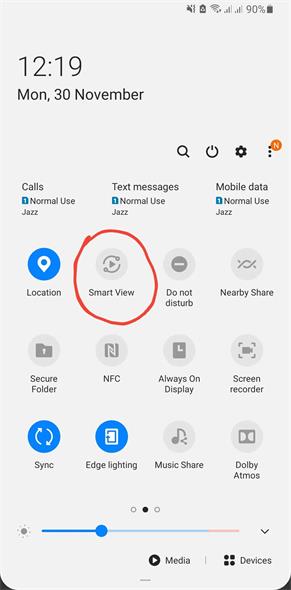
- Doing so will take you to a page where the Xiaomi Redmi 13C device will start searching for devices nearby.
- Tap on your Roku device to start sharing your Android screen with the Roku device.
- You must ensure that your Android device is functioning on version 4.4.2 or above before following this method. Also, you need to make sure that your Roku and your Android device is connected to the same network.
Method 2: Use Screen Mirroring App to Mirror Xiaomi Redmi 13C to Roku
Screen Mirroring App for Roku is an easy to use application that allows sharing pictures, videos, and documents from your Android device to Roku TV. You are not required to amend any phone or wifi setting on your device. All you need to make sure is that both the Roku and your Android device is connected to the same wifi network. The data is solely captured by the application for mirroring purposes only; no information is stored.
The only drawback of this app is that it still does not support sound; hence to share sound, you need to use Bluetooth speakers.
Step 1: Download the Screen Mirroring Application:
- Unlock your Android device and enter the Google Play Store.
- Download the “Screen Mirroring Application” using this link: https://play.google.com/store/apps/details?id=de.twokit.screen.mirroring.app.roku
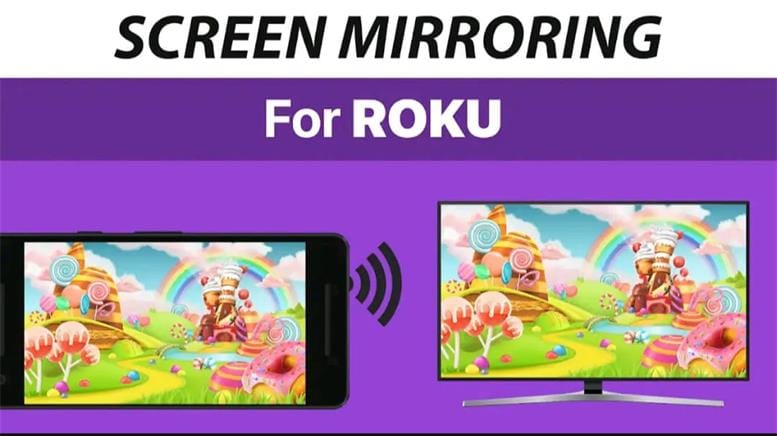
Step 2: Mirror Xiaomi Redmi 13C Device to Roku:
- Launch the application. The app will start to show all the Xiaomi Redmi 13C devices nearby to which you can share your screen.
- Select your Roku device.
Step 3: Add Channel to your Roku:
- On your Roku, tap on “Add Channel” to add a screen mirroring channel.
- The device will take time to process.
- Confirm your action by tapping on “OK” on the app or the Roku remote.
Step 4: Share your Android screen to Roku:
- From the application launched on your Android device, tap on the option of “Start Mirroring”
- After that, tap on “Start Now” from the pop-up screen to permit the app to start capturing your Android device screen.
- And you are done!
Method 3: Use Google Home to mirror Xiaomi Redmi 13C to Roku TV
Google Home is an excellent alternative to cast your Android to Roku; however, it only supports a handful of apps.
Step 1: Download Google Home:
- First, you need to download the Google Home application on your Android device.
Step 2: Connect Android Device to Roku
- Launch the application and tap on the “+” icon from the top left corner to reveal a menu.
- From there, select the option of “Set up Device”. From there, tap on “have something already set up”.
- Now select your Roku device from the Xiaomi Redmi 13C devices shown on your Android screen.
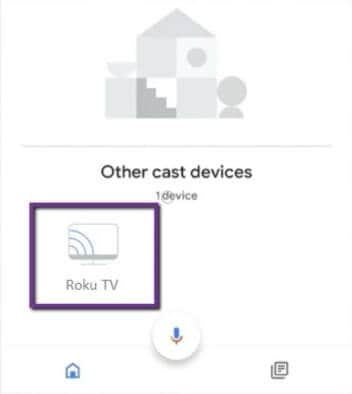
- After that, you will be asked to enter the login credentials of your Roku account.
- Your device will then show you on-screen instructions; follow them to connect your Android device to Roku TV successfully.
Step 3: Mirror your Android Screen to Roku
- Lastly, to mirror any video to Roku TV, tap on the “cast” icon from your screen.
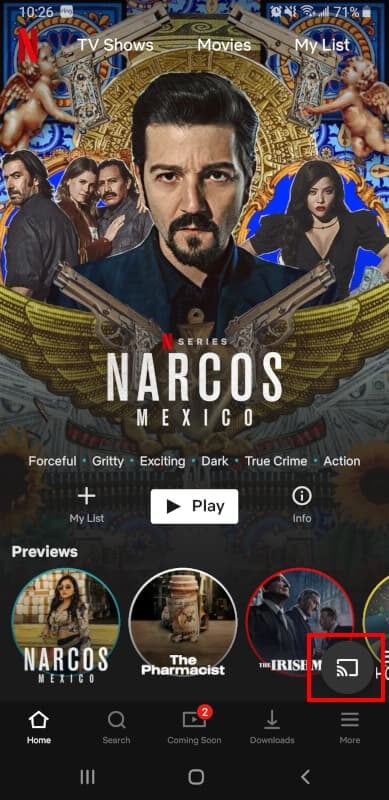
Bonus Point: Mirror and Control your Android Device to PC
Did you know that you could mirror your android screen to a PC and then control the Android activities via Windows? MirrorGo, an amazing software by Wondershare, has made it all possible! It is an exceptional application that comes with numerous fascinating features. The app is compatible with iOS as well as Android Devices. Here is how you can use them:
Step 1: Download MirrorGo on your Android Device:
- Use this link to install the MirrorGo application to your Android device: MirrorGo.wondershare .
- After installation, launch the application.
Step 2: Connect the Android Device to PC:
- Use an authentic USB cable to connect your Android device to your PC.
- From your Android Device, select the option of “Transfer Files” to continue.
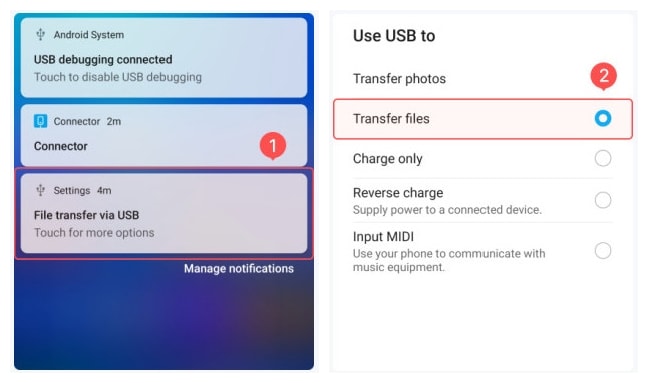
Step 3: Enable the Feature of USB debugging:
- Enter the settings menu on your Xiaomi Redmi 13C deviceand scroll down and tap on the option of “About”.
- To gain access to the “Developers Option”, tap on the option of “ Build Number” seven times.
- Now enter the Develops option and from here enable the feature of “USB Debugging.”
- A pop-up window will appear asking for permission to allow USB Debugging. Check the box of “Always allow from this computer” and tap on “OK” to continue.

Step 4: Mirror your Android Screen to PC:
- By following the step above correctly, your device will share the screen successfully on your laptop.
Step 5: Control your Android Device through PC:
- Once you cast your device screen to the PC, now you can control it too. For example, if you type in “best screen mirroring app for android” using the keyboard, it would also be shown on the Android screen.
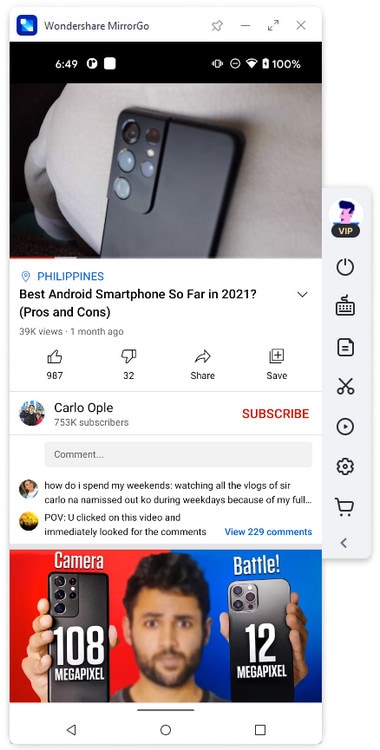
Conclusion
The methods explained above will help you to mirror the android screen to Roku effortlessly. Each method has its cons and pros; however, if you do not own a tv and want to share your android screen on a larger screen with your friends. For this purpose, MirrorGo is the finest option as it permits users to cast an android screen to the laptop and allows users to control their android device through a keyboard and mouse attached to the computer.
Also read:
- [New] Short Track Speed Skating Olympics 2022 Highlights
- [Updated] In 2024, Choosing Between Apple's MacBook Air & Pro M1 Performance Showdown
- Amplify Aspirations Top 10 Motivation Movies
- How To Use Allshare Cast To Turn On Screen Mirroring On Infinix Smart 8 | Dr.fone
- In 2024, Hero5 Black Meets Hero5 Session – A Visual Verdict
- In 2024, How to Cast Motorola Moto G84 5G to Computer for iPhone and Android? | Dr.fone
- In 2024, How to Cast OnePlus Nord CE 3 5G Screen to PC Using WiFi | Dr.fone
- In 2024, How to Mirror Lava Yuva 3 to Mac? | Dr.fone
- In 2024, How to Screen Mirroring Realme 11 5G to PC? | Dr.fone
- In 2024, iPogo will be the new iSpoofer On Xiaomi 14 Ultra? | Dr.fone
- In 2024, Wireless Methods to MirrorApple iPhone 8 & iPad to Fire Stick With Ease | Dr.fone
- Revolutionize Your Computing Experience with Acer, Dell, HP and Lenovo's Latest Offerings: Affordable Snapdragon X Windows Copilot PCs With Impressive Battery Life
- The Future of Siri: How Apple's Intelligence Evolution Will Transform the Assistant by 2025, According to ZDNet Coverage
- Top 10 Fingerprint Lock Apps to Lock Your Motorola Moto G23 Phone
- Top 5 Faultless Solutions to Fix World of Warships Crashes on Windows
- Title: How to Mirror Your Xiaomi Redmi 13C Screen to PC with Chromecast | Dr.fone
- Author: Seraphina
- Created at : 2025-02-09 04:04:50
- Updated at : 2025-02-11 23:26:31
- Link: https://screen-mirror.techidaily.com/how-to-mirror-your-xiaomi-redmi-13c-screen-to-pc-with-chromecast-drfone-by-drfone-android/
- License: This work is licensed under CC BY-NC-SA 4.0.